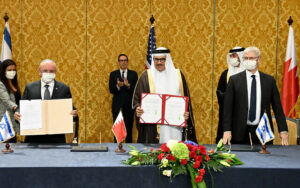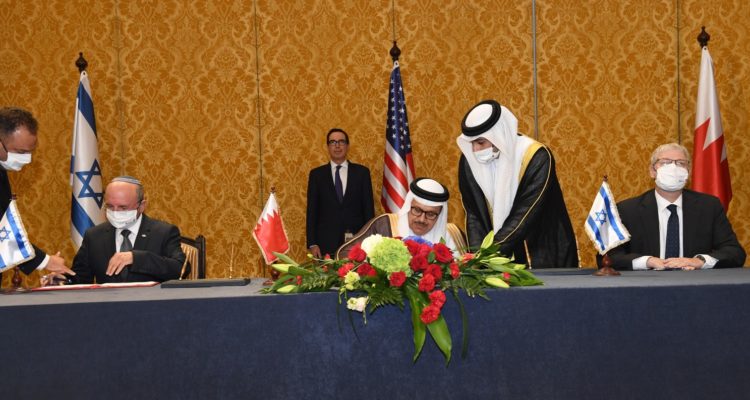Israel and Bahrain on Sunday agreed to establish formal diplomatic relations at a ceremony in Bahrain’s’ capital Manama, making the small Gulf country the fourth Arab state to normalize ties with Israel.
The agreement includes eight bilateral deals between the two countries in the areas of agriculture, civil aviation, technology and communications as well as joint cooperation in business and finance.
In a “Joint Communiqué on the establishment of diplomatic, peaceful, and friendly relations,” the two countries agreed to “recognize and respect each other’s sovereignty and right to live in peace and security, promote lasting security and eschew the threat and use of force… and settle all disputes by agreed peaceful means.”
שר החוץ של בחריין עבד אל-לטיף אל-לזיאני, מנכ"ל משרד החוץ אלון אושפיז והיועץ לביטחון לאומי מאיר בן שבת חותמים על ההודעה המשותפת לכינון יחסים דיפלומטיים בין ישראל לבחריין ועל 8 מזכרי הבנות בתחומים האשרות, התעופה, ההשקעות ועוד pic.twitter.com/e5zGFDkI2C
— Barak Ravid (@BarakRavid) October 18, 2020
“We started the day as friends and we’re concluding it as family members — members of the family of Abraham,” said the head of Israel’s National Security Council Meir Ben-Shabbat, who headed the Israeli delegation.

“It was indeed a historic visit, to start opening relations between both countries, to have fruitful bilateral relations in both fields,” said Bahrain’s foreign minister, Abdullatif al-Zayani, at the signing ceremony.
“My hope is that this visit marks another step forward on the road to a truly peaceful, secure, stable, and thriving Middle East, one in which all states, races and faiths resolve differences through dialogue and develop for our children a new reality of coexistence and prosperity,” he said.
Bahrain joined the United Arab Emirates at a festive White House ceremony last month marking the “Abraham Accords,” a pair of U.S.-brokered diplomatic pacts with Israel. While the UAE’s deal with Israel formally established ties, the agreement with Bahrain was less detailed and included a mutual pledge to follow suit.
Sunday’s visit appeared to complete that task, clearing the way for the countries to open embassies and exchange ambassadors in the coming months.
Israel’s commercial El Al flight 973 — a nod to the international dialing code for Bahrain — flew through Saudi Arabia’s airspace en route to Manama. Although Saudi Arabia has not normalized ties with Israel, it has signaled tacit support for the moves by its Gulf neighbors, which reflect shared concerns about Iran.
The El Al flight landed at Bahrain International Airport on Sunday afternoon. The kingdom’s state-owned television channels did not carry the arrival live. Bahrain’s state-run news agency later published pictures of the arrival, acknowledging the Israeli officials were there to sign documents “establishing diplomatic relations between the kingdom of Bahrain and the state of Israel, in addition to a number of memoranda of understanding in the areas of joint cooperation.”
In a rare recording, the Islamic State group condemned the move toward normalization with Israel, identifying the UAE and Bahrain and also accusing Saudi Arabia of showing “subservience to crusaders” and Jews.
“Here now, the Jews have come to you and are walking freely in your streets and countries, feeling safe and secure with approval from your tyrants and supported by your edicts,” said the group’s spokesman, Abu Hamza al-Qurayshi. He also called for attacks to undermine the Saudi economy.
It was the first recording by al-Qurayshi in about a year.
Egypt and Jordan are the only other two Arab states to sign diplomatic treaties with Israel, in 1979 and 1994, respectively. Other Arab countries could follow suit, with analysts and insiders pointing to Sudan, Oman and Morocco as possibilities.
The trip to Bahrain on Sunday also came as U.N. arms embargoes on Iran expired despite American objections. Bahrain, like several other Gulf Arab nations, views Iran as the most serious threat to its security in the Persian Gulf.
(YWN Israel Desk – Jerusalem & AP)












2 Responses
Democrats only know how to destroy the middle east
1, be more general
They only know how to destroy the world